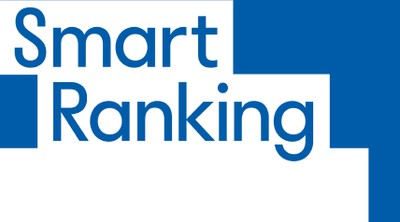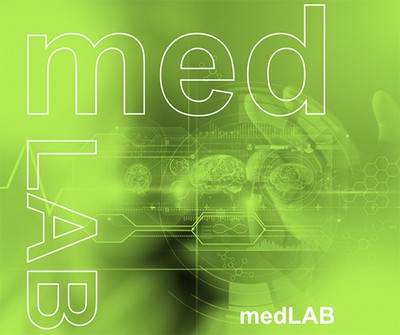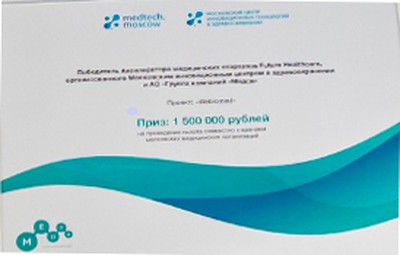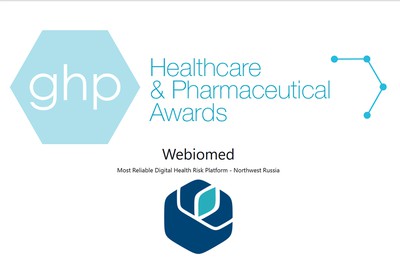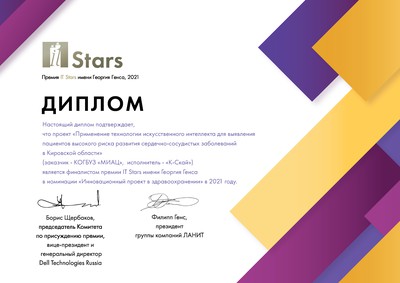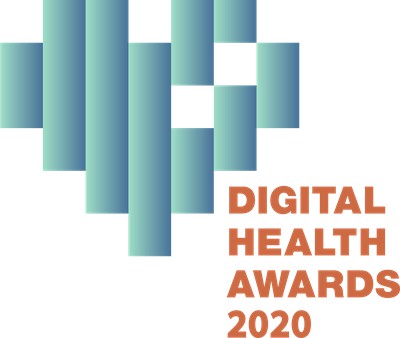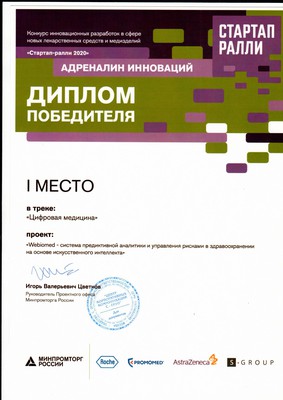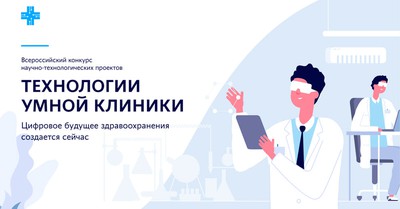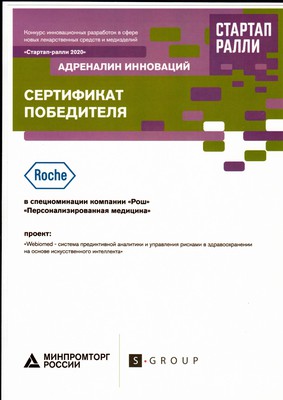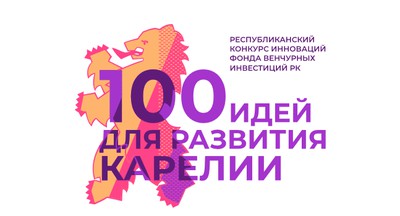 02/05/2023 • gazeta.ru
02/05/2023 • gazeta.ru
Experts Medical institutes PETRGU, PETROZAVODSK STATE UNIVERSITY, FEDERAL STATE-FUNDED EDUCATIONAL INSTITUTION FOREIGN ECONOMIC ASSOCIATION "PETROZAVODSKY STATE UNIVERSITY" together with the IT company LLC "K-SKAY" (the resident Fund "Skolkovo", the developer of the Webiomed platform) developed mathematical model for the forecast of developments asymptomatic atherosclerosis of carotids at patients with obesity and excess weight.
The algorithm of the exact forecast for asymptomatic atherosclerosis of carotids was created in Russia
 12/04/2023 • cnews
12/04/2023 • cnews
The medical medical and diagnostic center "MiG" and the Company "K-Skye", the developer of the Webiomed platform, Artificial intelligence for analyses the depersonalized medical data and forecasting of developments diseases of patients started the joint project of introduction of technologies. It increases efficiency the profilakticheskoymeditsinsky helps. Representatives reported about this CNews "Skolkovo". With help algoritmovWebiomed already it was analysed from above 4000obezlichennykh electronic medical records of the MiG center: weight, growth, age, rezultatyuzi IEKG, texts of medical examinations, data of the laboratory...
AI from a Skolkovo resident helped reduce the risk of developing cardiovascular diseases
 10/02/2023 • nationalprojects.rf
10/02/2023 • nationalprojects.rf
Developers from Russia, with the support of the Science and Universities national project, have taught artificial intelligence (AI) to analyze data from an electronic medical record, taking into account indicators collected by remote monitoring, ANO National Priorities reported.
Artificial intelligence was taught to analyze diagnoses in Russia
 24/01/2023 • None
24/01/2023 • None
None
 10/01/2023 • nauka.tass.ru
10/01/2023 • nauka.tass.ru
A new approach in diagnostic aproach is being developed by K-Sky and MTP Newdiamed together with the Moscow City Scientific Society of Therapists
AI-based medical diagnostics will appear in Russia in 2023
 29/12/2022 • rb.ru
29/12/2022 • rb.ru
RB.RU Presents the first issue of RB Choice, an annual special project in which we select 100 promising Russian companies.
RB CHOICE — 100 promising Russian startups
 10/11/2022 • russian.rt
10/11/2022 • russian.rt
None
 03/11/2022 • vc.ru
03/11/2022 • vc.ru
None
 20/10/2022 • arppsoft.ru
20/10/2022 • arppsoft.ru
None
 06/09/2022 • None
06/09/2022 • None
None
 24/06/2022 • None
24/06/2022 • None
None
 31/05/2022 • None
31/05/2022 • None
None
 12/05/2022 • hightech.plus
12/05/2022 • hightech.plus
K-Skai a resident of the Skolkovo Foundation, became the first Russian company in the field of artificial intelligence in medicine, which received a quality management system (QMS) certificate of compliance with ISO 13485:2016.
K-Skai received a a EAEU certificate of conformity
 01/04/2022 • trends.rbc.ru
01/04/2022 • trends.rbc.ru
Over the past two years, investments in Russian high-tech medicine is almost $ 100 million. RBC Trends found out what products and services already exist in the market and what the industry expects in the future
What is MedTech and how it changes our lives
 23/03/2022 • petrsu.ru
23/03/2022 • petrsu.ru
The development of a digital expert module is carried out at the Laboratory of Artificial Intelligence in Medicine, opened at the Scientific and Educational Center for High Biomedical Technologies of the Medical Institute of PetrSU as part of the modernization of the Unique Scientific Installation. The UNU project is being implemented in the cooperation of PetrSU and K-Sky, a resident of the Skolkovo Foundation.
Medical Decision Support Module
 13/03/2022 • rbc.ru
13/03/2022 • rbc.ru
The best five projects of the Future Healthcare accelerator was named in Moscow, they can be further integrated into the capital's healthcare system.
The winners of the medical startups accelerator were chosen in Moscow
 15/02/2022 • dp.ru
15/02/2022 • dp.ru
Chief Business Development Officer Webiomed and the leading expert in artificial intelligence of the "Central Research Institute for the Organization and Informatization of Healthcare" of the Ministry of Health of Russia Alexander Gusev spoke about how people will monitor our health in the future.
Gadgets instead of doctors: what the healthcare system is turning into in the future
 14/02/2022 • Forbes
14/02/2022 • Forbes
A cloud system based on artificial intelligence (AI) was created by entrepreneurs from Karelia Alexander Gusev and Roman Novitsky. Webiomed analyzes de-identified information about patients from electronic medical records, predicts the likelihood of complications and makes recommendations for treatment. Based on its platform, the company also conducts research for pharmaceutical giants such as AstraZeneca, Takeda and Sanofi.
Health Forecast: How Karelia MedTech Startup Attracts AstraZeneca's Attention
 17/01/2022 • cnews.ru
17/01/2022 • cnews.ru
The international biopharmaceutical company AstraZeneca and K-Skai, a resident of the Skolkovo Foundation, signed a memorandum on the joint implementation of the project “Improving the diagnosis of chronic kidney disease through the development and implementation of a medical decision support system”.
Artificial intelligence will help detect kidney disease at an early stage
 14/01/2022 • None
14/01/2022 • None
Webiomed is a system for automatic analysis of de-identified medical data.
The system analyzes various medical data, identifies risk factors and suspicions of diseases, forms forecasts based on them, containing a comprehensive assessment of the likelihood of developing various diseases and the patient's death from them.
Top 10 companies from Skolkovo that deserve your attention
 17/12/2021 • karelia.news
17/12/2021 • karelia.news
The European Conference of the World Health Organization on Combating Noncommunicable Diseases using Digital Healthcare Solutions was held in Moscow on December 14 and 15.
Alexander Gusev made a presentation on the topic "Using artificial intelligence to reduce preventable morbidity and mortality from non-communicable diseases in the Russian Federation"
An expert from Petrozavodsk spoke about artificial intelligence in medicine at the WHO conference
 13/12/2021 • vc.ru
13/12/2021 • vc.ru
The use of artificial intelligence (AI) in medicine is a leading trend in global healthcare. AI technologies not only simplify the lives of patients and doctors by performing tasks faster and cheaper, but also sometimes diagnose better and more accurately. We are talking about five medical developments from Skolkovo, in which AI algorithms are used.
Medicine of the future: 5 developments based on artificial intelligence from Skolkovo
 02/12/2021 • tass.ru
02/12/2021 • tass.ru
December 2nd. The organizing committee of the National Prize in the field of advanced technologies "Priority - 2021" announced the winners of the competition.
The winners of the "Priority - 2021" award were announced in Moscow
 02/11/2021 • nauka.tass.ru
02/11/2021 • nauka.tass.ru
The unique scientific installation (UNU) of Petrozavodsk State University (PetrSU) will be used by doctors in medical institutions of Karelia as a medical decision support system by the end of 2021.
Doctors of Karelia will have access to the medical decision support system
 06/10/2021 • it-world
06/10/2021 • it-world
One of the already awarded Russian IT industries is the IT Stars award named after V.I. George Gens (www.itstars-award.ru). The organizer of the LANIT award. The award bears the name of the founder of the company, on whose initiative the IT Stars award was conceived. Among the finalists is the project "Using artificial intelligence technology to identify patients at high risk of developing cardiovascular diseases in the Kirov region."
Star Alignment
 10/09/2021 • evercare.ru
10/09/2021 • evercare.ru
This study was compiled to assess the Russian market for AI start-ups in the field of healthcare and assess their potential.
AI Startup Ranking: Prospects for Russian Healthcare
 02/09/2021 • rbc.ru
02/09/2021 • rbc.ru
Over the past year and a half, almost as much money was invested in digital medicine as during the entire period of the industry's formation. Remote consultations, AI and a robot as an assistant are already the realities of healthcare.
The main trends of the Russian MedTech market
 09/06/2021 • Izvestia
09/06/2021 • Izvestia
By the end of this year, the Electronic Clinical Examination project will be launched in Russia. The project is aimed at diagnosing rare (orphan) genetic diseases. Diseases will be identified on the basis of electronic health records with the application of artificial intelligence technologies.
A project to identify rare genetic diseases using AI will be launched in Russia
 20/04/2021 • cnews.ru
20/04/2021 • cnews.ru
Webiomed, the predictive analytics platform based on machine learning has got the status of an “Other Information System”
Artificial intelligence will help doctors to diagnose more precisely
 20/04/2021 • Kommersant
20/04/2021 • Kommersant
The leader of the Russian market of medical information systems, RT Medical Information Systems (RT MIS, a part of the Rostelecom group of companies) and K-SkAI, a resident of the Skolkovo Foundation, have signed an agreement on cooperation in the field of artificial intelligence.
RT MIS and K-SkAI are launching a smart platform for healthcare
 23/12/2020 • RUSBASE
23/12/2020 • RUSBASE
Over the ten years of its existence, the Skolkovo Foundation has changed the domestic market for startups and innovative technologies radically. On the occasion of the Foundation's anniversary, Rusbase talked to four promising residents.
4 Russian startups that are changing our lives right now
 19/10/2020 • Republic portal
19/10/2020 • Republic portal
Specialists of the Republic of Karelia are launching a system that will soon help physicians in any clinic to make correct diagnoses for patients long before the signs of the disease become obvious. Denis Gavrilov, Webiomed Chief Medical Officer and a cardiologist, have spoken about the system.
In the fight against an invisible enemy
 22/07/2020 • Skolkovo
22/07/2020 • Skolkovo
К-SKAI Company has attracted more than $1,8 million of private investment for the Webiomed project development and expansion to international markets.
Webiomed, a resident of Skolkovo has attracted more than $1,8 million of private investment
 21/07/2020 • Ministry of Health of the Russian Federation
21/07/2020 • Ministry of Health of the Russian Federation
The pilot implementation of the clinical decision support system has been completed in medical organizations of the Kirov region of Russia. The developers have carried out two scientific studies, analyzed the results and the effectiveness of the system. According to the governor of the Kirov Region, the implementation of the pilot project was the first step to the healthcare of the future, which will focus on early detection of diseases and saving human life with the use of artificial intelligence.
Artificial intellegence is being used in the healthcare of Kirov region
 19/06/2020 • EverCare
19/06/2020 • EverCare
The introduction of CDSS in clinical care raises a number of legal challenges for healthcare providers and developers of artificial intelligence systems in Russia and around the world. The first regulatory documents have already been adopted, but the legislation in this area is still at the formation stage. Alexander Gusev, Chief Business Development Officer of Webiomed, spoke about the process of CDSS registration.
Experience of the first registration of the WSSP in Russia
 11/06/2020 • Skolkovo Foundation
11/06/2020 • Skolkovo Foundation
How Skolkovo Ventures helps startups to rebuild themselves in the new business reality
Stanislav Kolesnichenko: Skolkovo Ventures helps startups to rebuild in a new business reality
 22/04/2020 • None
22/04/2020 • None
Roszdravnadzor has registered the Webiomed clinical decision support system as a medical device. It became the first software product with artificial intelligence that has passed technical and clinical trials and received permission for use in Russian hospitals and clinics. The Webiomed system was developed by the K-SkAI Group of Companies, a resident of the Skolkovo Foundation.
Artificial intelligence from a Skolkovo resident was registered as a medical device
 12/08/2019 • Zdrav.fom
12/08/2019 • Zdrav.fom
Artificial intelligence identified 67 people who needed additional examination and treatment. As it turned out, AI found that these people had a very high risk of heart attack or stroke. Now doctors are conducting in-depth examination and treatment of these patients. That is, the use of Webiomed made it possible to identify those who need additional attention from doctors.
AI will help Yamal physicians to identify dangerous diseases at an early stages
 12/08/2019 • MIBS
12/08/2019 • MIBS
In early 2019, the Association of Developers and Users of Artificial Intelligence in Medicine "National Medical Knowledge Base" conducted a pilot project in the Yamalo-Nenets Autonomous Okrug, testing two products - the Webiomed system of the K-MIS company (for prevention of cardiovascular diseases) and the Botkin AI of the Intellogic company (to search for foci of the disease using CT of the lungs).
Does Russia have artificial intelligence?
 13/07/2019 • Rossiyskaya Gazeta
13/07/2019 • Rossiyskaya Gazeta
Yamal became the first large platform for testing artificial intelligence in medicine in Russia. The results have amazed specialists: in just two and a half months, the machine mind examined 30 thousand electronic health records of the hospital in Muravlenko town, which is almost the entire population of the town.
Can artificial Intelligence replace phycisians?
 06/05/2019 • National Technology Initiative (NTI)
06/05/2019 • National Technology Initiative (NTI)
Artificial intelligence has increased the detection of risk factors for cancer. The phenomenal result was discussed today by Russian medical big names in Salekhard.
How artificial intelligence can help physicians in their work
 10/04/2019 • Rossiyskaya Gazeta
10/04/2019 • Rossiyskaya Gazeta
In clinical trials, the robot analyzed nearly 30,000 of the hospital's electronic health records. In fact, this is almost the entire population of Muravlenko, which has 32 thousand inhabitants. In a third of cases, patients with a high and very high risk of developing cardiovascular diseases were identified. Now doctors are inviting them for an in-depth examination.
Artificial intelligence has examined 30,000 patients
 10/04/2019 • COMNEWS
10/04/2019 • COMNEWS
In Yamal, two projects have been implemented at once to introduce a clinical decision support system into clinical practice in oncology and preventive medicine. Artificial intelligence is unable to make a diagnosis, but it helps doctors notice neoplasms at an early stage when they are treatable, and suspect a high risk of heart ailments. So, out of 600 images of Yamal patients processed by the system, 45 people were suspected of having an oncological pathology. In the Muravlenko town hospital, after processing 30 thousand electronic health records, following the results of medical examination, it turned out that a third of them have a high risk of developing cardiovascular diseases. The obtained results are very useful to further reduce morbidity and mortality from CVDs.
Yamal is among the pilot regions that began to implement AI in healthcare
 09/04/2019 • Ministry of Health of Russian Federation
09/04/2019 • Ministry of Health of Russian Federation
A Research and Practice conference dedicated to the topic of artificial intelligence in medicine has ended in Salekhard. Its implementation in the industry has been actively discussed over the past few years. Experts, developers, and big names of science gathered in Salekhard to discuss aspects of applying AI in practice.
AI will help Yamal physicians to identify dangerous diseases at early stages
 09/04/2019 • Yamal government
09/04/2019 • Yamal government
Clinical decision support systems based on artificial intelligence should be actively implemented throughout the entire healthcare industry in the Arctic region. This proposal was the result of the discussion of the pilot project results at the "Artificial Intelligence in Medicine" Research and Practice conference held in Salekhard.
Yamal government decides to expand AI implemetation
 06/04/2019 • Komsomolskaya pravda
06/04/2019 • Komsomolskaya pravda
Artificial intelligence helps Yamal physicians to detect cancer at an early stage. Since the beginning of 2019, the Webiomed system has been undergoing clinical trials at the Muravlenkovo City Hospital. The first results are very encouraging.
Artificial Intelligence helps Yamal physicians to identify early-stage cancer
 05/04/2019 • TOPNEWS
05/04/2019 • TOPNEWS
For the pilot project, a hospital in Muravlenko town was selected, where there is a large database of electronic medical records and an information system that can adapt to work with artificial intelligence.
AI was able to process electronic health records of the entire hospital population (25 thousand patients) in just 123 hours or about 5 days. The average processing time for 1 patient ranged from 30 seconds to 2 minutes (depending on the volume of the EHR).
Can artificial Intelligence replace human doctors?
 05/04/2019 • SEVERPRESS
05/04/2019 • SEVERPRESS
Artificial intelligence in Muravlenko has helped to identify dozens of patients to risk groups. The pilot project of artificial intelligence in Yamal was launched in Muravlenko in December 2018, the actual work was carried out for three months. During this time, the city hospital was connected to the artificial intelligence system, there are first results.
Artificial Intelligence in Muravlenko town helped to detemine dozens of patients at risk
 05/04/2019 • VESTI YAMAL
05/04/2019 • VESTI YAMAL
At the end of last year, the Muravlenkovo hospital was connected to the artificial intelligence system. More than 1 300 thousand medical electronic documents of twenty-five thousand citizens were processed. Based on the data, patients at risk for cardiovascular diseases were identified. Many of them were previously not registered and did not come to the hospital.
The "Artificial Intelligence in Medicine" Research-to-Practice conference was held in Salekhard









